Table of contents
- Why Manufacturing?
- Detailed Breakdown of Each Manufacturing Idea
- 1. Scented Candle Making
- 2. Handmade Soap Manufacturing
- 3. Paper Bag and Eco-Friendly Packaging
- 4. Incense Stick (Agarbatti) Making
- 5. Herbal Powder and Spice Blends
- 6. Cotton Wicks (Diya Batti) Manufacturing
- 7. Chalk Making
- 8. Papad Making
- 9. Jute Products Manufacturing
- 10. Clay Products Manufacturing
- Conclusion
- Expanded Frequently Asked Questions (FAQs)
Starting a manufacturing business doesn’t always require a massive investment. With careful planning and strategic execution, you can launch a profitable venture with a budget of under ₹50,000. This article explores 10 viable manufacturing business ideas that fit this budget, providing a step-by-step guide to get you started.
Why Manufacturing?
In a world increasingly dominated by digital services, the tangible and essential nature of manufacturing remains a cornerstone of economic activity. Starting a manufacturing business, even on a small scale, offers several distinct advantages:
- Tangible Product, Tangible Value: Unlike service-based businesses, manufacturing involves creating physical products, providing a sense of accomplishment and direct value creation.
- Scalability: Manufacturing businesses can often be scaled up as demand increases, allowing for significant growth potential.
- Control Over Quality: You have direct control over the quality of your products, ensuring customer satisfaction and building brand reputation.
- Potential for Unique Products: Manufacturing allows for innovation and the creation of unique products that cater to specific market needs.
- Local Economic Impact: Small manufacturing businesses contribute to local economies by creating jobs and supporting local suppliers.
- Reduced Reliance on Service Industry: Diversifies your skill set, and provides a business that is not dependent on the service industry.
Detailed Breakdown of Each Manufacturing Idea
1. Scented Candle Making

Transforming simple wax and fragrance into vessels of ambiance and relaxation, scented candle making offers a creative outlet and a product that brings warmth and comfort to homes.
Idea Deep Dive:
- Focus on natural waxes (soy, beeswax) and essential oils for premium products.
- Explore unique container designs (terracotta pots, recycled glass).
- Offer personalized candle services for events and gifts.
a. Why this Idea :
- The aromatherapy market is booming, with consumers seeking relaxation and stress relief.
- Handmade candles offer a personal touch that mass-produced candles lack.
b. Licenses Required :
- Shop Act License (for operating a business).
- GST registration (if annual turnover exceeds the threshold).
- Potential quality certifications if you make claims about natural ingredients.
c. Investment Required :
- Wax (₹10,000-₹15,000).
- Essential oils and fragrances (₹5,000-₹10,000).
- Wicks, molds, and containers (₹3,000-₹5,000).
- Packaging and labeling (₹2,000-₹5,000).
- Basic melting/pouring tools, and safety equipment.
d. How to Sell :
- Create an engaging Instagram or Facebook page to showcase your products.
- List your candles on Etsy or other craft marketplaces.
- Participate in local craft fairs and markets.
- Target local gift shops, and home decor boutiques.
e. Any other Requirements :
- Dedicated workspace with proper ventilation.
- Accurate weighing scales and thermometers.
- Knowledge of fragrance blending and wax ratios.
f. Challenges in the Idea :
- Achieving consistent fragrance throw and burn quality.
- Competing with established candle brands.
g. How to overcome the Challenges :
- Thorough testing and documentation of your candle-making process.
- Focus on unique selling propositions (USPs) like eco-friendly materials or custom designs.
h. Example: A business specializing in “mood candles” with specific essential oil blends designed for relaxation, focus, or energy. They use sustainable packaging and offer refill services.
2. Handmade Soap Manufacturing
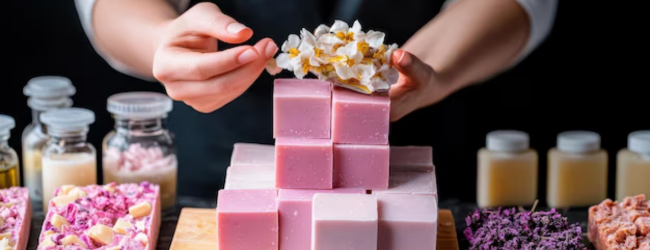
Harnessing the power of natural ingredients, handmade soap manufacturing allows for the creation of luxurious, personalized skincare products that cater to a growing demand for organic and gentle cleansing.
Idea Deep Dive:
- Explore cold-process, hot-process, and melt-and-pour soap-making techniques.
- Focus on using natural ingredients like shea butter, coconut oil, and essential oils.
- Create soaps for specific skin types (sensitive, dry, oily) or concerns (acne, eczema).
- Offer unique shapes, colors, and textures.
- Offer bundled products, such as soap, with a natural loofah, or a natural soap dish.
a. Why this Idea:
- Growing demand for natural and organic personal care products.
- Handmade soaps offer a luxurious and customizable experience.
- Potential for high profit margins with premium ingredients.
b. Licenses Required:
- Shop Act License.
- GST registration (if applicable).
- Potentially quality certifications if you make claims about organic or therapeutic properties.
c. Investment Required:
- Oils and butters (₹10,000-₹15,000).
- Lye (sodium hydroxide) and distilled water (₹1,000-₹2,000).
- Essential oils and natural colorants (₹5,000-₹8,000).
- Molds, cutting tools, and safety equipment (₹3,000-₹5,000).
- Packaging and labeling materials (₹4,000-₹6,000).
d. How to Sell:
- Create visually appealing product photos for online platforms.
- Highlight the natural ingredients and benefits of your soaps.
- Offer samples or trial sizes to attract new customers.
- Partner with local spas, salons, and health food stores.
e. Any other Requirements:
- Safe workspace with proper ventilation.
- Accurate weighing scales and thermometers.
- Knowledge of saponification and safe handling of lye.
f. Challenges in the Idea:
- Maintaining consistent quality and pH levels.
- Achieving desired colors and scents.
- Proper curing time for cold-process soaps.
g. How to overcome the Challenges:
- Follow precise recipes and measurements.
- Use high-quality ingredients and conduct thorough testing.
- Invest in proper curing racks and storage.
h. Example: A business that creates soaps with locally sourced, organic ingredients, using traditional cold-process methods. They offer a range of soaps for different skin types and concerns, packaged in biodegradable wrappers.
ALSO READ | Start an Online Marketing Home based Business : Step-by-Step Guide for 2025
3. Paper Bag and Eco-Friendly Packaging
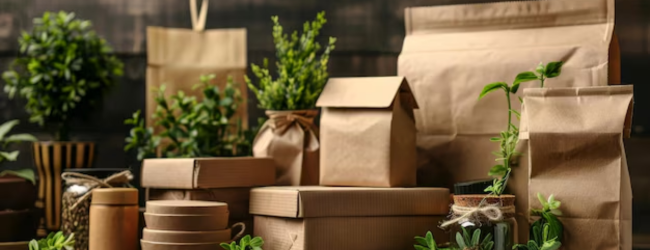
Addressing the urgent need for sustainable alternatives, paper bag and eco-friendly packaging manufacturing offers a chance to contribute to a greener planet while providing essential solutions for businesses and consumers alike.
Idea Deep Dive:
- Specialize in customized paper bags for specific industries (food, retail, gifts).
- Offer a variety of sizes, shapes, and handle options.
- Explore eco-friendly alternatives like seed paper or biodegradable films.
- Create custom printed boxes, and packaging for online retailers.
a. Why this Idea:
- Increasing regulations against plastic packaging.
- Growing demand for sustainable and biodegradable options.
- Potential for long-term contracts with businesses.
b. Licenses Required:
- Shop Act License.
- GST registration (if applicable).
c. Investment Required:
- Rolls of paper (kraft, recycled, etc.) (₹15,000-₹20,000).
- Cutting tools and folding machines (₹10,000-₹15,000).
- Printing equipment (screen printing, flexography) (₹10,000-₹15,000).
- Adhesives and handles (₹3,000-₹5,000).
- Computer, and designing software.
d. How to Sell:
- Target local businesses and retailers directly.
- Create a website or online catalog showcasing your products.
- Participate in trade shows and exhibitions.
- Offer samples, and custom design services.
e. Any other Requirements:
- Adequate storage space for paper rolls and finished products.
- Basic printing and cutting skills.
- Graphic design skills, if offering custom print services.
f. Challenges in the Idea:
- Competing with larger manufacturers on price.
- Managing inventory and meeting deadlines.
- Ensuring consistent print quality.
g. How to overcome the Challenges:
- Focus on niche markets and offer customized solutions.
- Build strong relationships with local suppliers.
- Use high quality inks, and maintain equipment.
h. Example: A business that specializes in custom-printed paper bags for bakeries and cafes, using recycled paper and vegetable-based inks. They offer fast turnaround times and competitive pricing.
💡 Pro Tip: If you want to start a Manufacturing Business but have too many doubts, connect with a Manufacturing Business expert from Boss Wallah for guidance – https://bw1.in/1116
4. Incense Stick (Agarbatti) Making
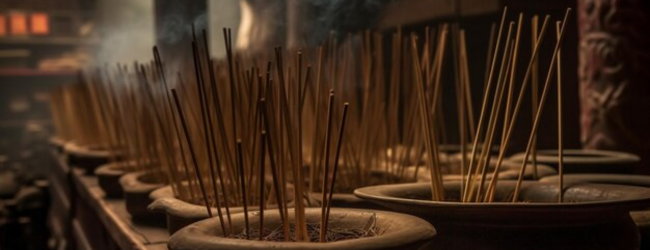
Weaving together tradition and aroma, incense stick making provides a pathway to create products that enhance spiritual practices, create calming environments, and fill spaces with soothing scents.
Idea Deep Dive:
- Explore traditional Indian fragrances (sandalwood, rose, jasmine) and unique blends.
- Offer incense sticks for specific purposes (meditation, relaxation, aromatherapy).
- Create different shapes and sizes (cones, coils, sticks).
- Use natural binding agents, and sustainable bamboo.
a. Why this Idea:
- Consistent demand in religious and spiritual practices.
- Growing interest in aromatherapy and home fragrance.
- Relatively low startup costs.
b. Licenses Required:
- Shop Act License.
- GST registration (if applicable).
c. Investment Required:
- Bamboo sticks (₹5,000-₹8,000).
- Charcoal powder and wood dust (₹3,000-₹5,000).
- Fragrance oils and essential oils (₹5,000-₹10,000).
- Rolling machines and drying racks (₹2,000-₹4,000).
- Packaging materials (₹2,000-₹3,000).
d. How to Sell:
- Target religious stores and spiritual centers.
- Sell online through e-commerce platforms and social media.
- Participate in local markets and craft fairs.
- Create gift sets, and bundled products.
e. Any other Requirements:
- Dedicated workspace with proper ventilation.
- Basic mixing and rolling skills.
- Knowledge of fragrance blending.
f. Challenges in the Idea:
- Achieving consistent fragrance blending.
- Ensuring even burning and long-lasting scent.
- Competing with established brands.
g. How to overcome the Challenges:
- Experiment with different fragrance combinations.
- Use high-quality fragrance oils and binding agents.
- Maintain consistent quality control.
h. Example: A business that produces incense sticks with traditional Indian fragrances and natural binding agents, focusing on purity and authenticity. They offer a range of fragrances for different purposes and occasions.
5. Herbal Powder and Spice Blends
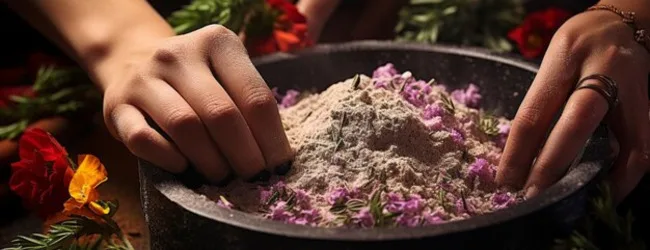
Blending the wisdom of nature with culinary creativity, herbal powder and spice blend manufacturing offers a chance to create products that elevate meals and support wellness through natural ingredients.
Idea Deep Dive:
- Specialize in specific herbal powders (ashwagandha, turmeric, moringa) or spice blends (garam masala, chai masala, regional spice mixes).
- Focus on organic and sustainably sourced ingredients.
- Offer custom blends for dietary needs (gluten-free, low-sodium).
- Offer bundled spice gift sets, and recipe cards.
a. Why this Idea:
- Growing demand for natural remedies and healthy cooking.
- Potential for high profit margins with premium ingredients.
- Increasing interest in Ayurvedic and traditional medicine.
b. Licenses Required:
- FSSAI license (mandatory for food products).
- Shop Act License.
- GST registration (if applicable).
c. Investment Required:
- Raw herbs and spices (₹15,000-₹20,000).
- Grinding and blending equipment (₹10,000-₹15,000).
- Packaging materials (jars, pouches) (₹5,000-₹8,000).
- Labeling and sealing equipment (₹3,000-₹5,000).
d. How to Sell:
- Online platforms (Amazon, specialized health food sites).
- Local grocery stores and health food stores.
- Farmers’ markets and organic food fairs.
- Create a website, with recipes, and product information.
e. Any other Requirements:
- Knowledge of herbs and spices and their properties.
- Hygienic processing and packaging.
- Proper storage to maintain freshness.
f. Challenges in the Idea:
- Maintaining consistent quality and taste.
- Ensuring proper shelf life.
- Sourcing high-quality raw materials.
g. How to overcome the Challenges:
- Strict quality control measures.
- Proper storage and packaging.
- Build relationships with reliable suppliers.
h. Example: A business that produces custom spice blends tailored to regional cuisines, using organic and locally sourced ingredients. They provide recipe suggestions and usage tips.
6. Cotton Wicks (Diya Batti) Manufacturing
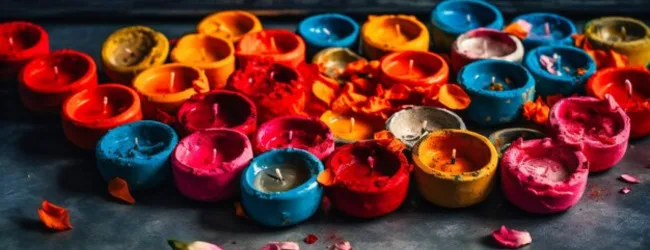
Illuminating traditions and homes, cotton wick manufacturing provides an essential product for religious ceremonies and daily lighting, with a simple yet consistent demand.
Idea Deep Dive:
- Offer a variety of sizes and thicknesses.
- Specialize in specific types of cotton (long-staple, organic).
- Create pre-rolled wicks for convenience.
- Offer different packaging options, from small retail packs, to large bulk packs.
a. Why this Idea:
- Consistent demand in religious ceremonies and daily use.
- Low startup costs.
- Simple manufacturing process.
b. Licenses Required:
- Shop Act License.
- GST registration (if applicable).
c. Investment Required:
- Cotton rolls (₹8,000-₹12,000).
- Thread and rolling tools (₹2,000-₹3,000).
- Cutting tools and measuring scales (₹1,000-₹2,000).
- Packaging materials.
d. How to Sell:
- Religious stores and temples.
- Local markets and bazaars.
- Online platforms (e-commerce sites).
- Wholesale to local stores.
e. Any other Requirements:
- Basic rolling and cutting skills.
- Clean workspace.
f. Challenges in the Idea:
- Competition from established manufacturers.
- Maintaining consistent quality.
- Finding reliable cotton suppliers.
g. How to overcome the Challenges:
- Offer unique packaging or sizes.
- Focus on high-quality materials.
- Build relationships with many suppliers, to ensure constant product flow.
h. Example: Produce long lasting cotton wicks, that are made from high quality cotton, and are packaged in bulk for temples, and stores.
7. Chalk Making

Facilitating learning and artistic expression, chalk manufacturing provides a fundamental tool for education and creativity, with a consistent need in schools and art studios.
Idea Deep Dive:
- Specialize in dustless chalk or colored chalk.
- Offer different sizes and shapes (round, square, triangular).
- Create chalk for specific purposes (blackboards, art projects).
- Offer bulk sales to schools.
a. Why this Idea:
- Consistent demand in schools and educational institutions.
- Low material costs.
- Simple manufacturing process.
b. Licenses Required:
- Shop Act License.
- GST registration (if applicable).
c. Investment Required:
- Plaster of Paris (₹10,000-₹15,000).
- Molds and drying racks (₹5,000-₹8,000).
- Coloring agents (₹3,000-₹5,000).
- Packaging materials.
d. How to Sell:
- Schools and educational institutions.
- Stationery stores and art supply shops.
- Online platforms.
e. Any other Requirements:
- Basic mixing and molding skills.
- Adequate drying space.
f. Challenges in the Idea:
- Maintaining consistent quality and texture.
- Preventing breakage during transport.
- Proper drying time.
g. How to overcome the Challenges:
- Use high-quality plaster of Paris.
- Proper drying techniques.
- Sturdy packaging.
h. Example: Produce dustless chalk, that reduces allergy risks, and is packaged in colorful boxes for children.
ALSO READ | Start Real Estate Business With Zero Investment in 8 Simple Steps
8. Papad Making
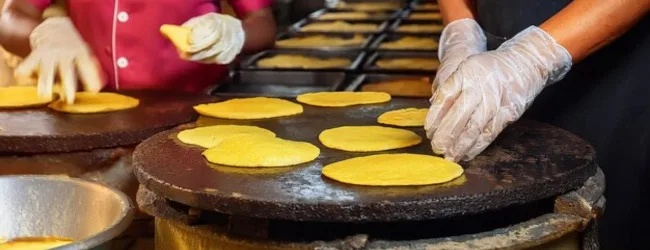
Bringing a taste of tradition to tables, papad manufacturing offers the opportunity to create a beloved Indian snack, with a long shelf life and consistent culinary appeal.
Idea Deep Dive:
- Focus on regional flavors and unique ingredients (rice flour, lentil flour).
- Offer different sizes and shapes.
- Create low-salt or gluten-free papads.
- Offer different spice levels.
a. Why this Idea:
- High demand in Indian cuisine.
- Long shelf life.
- Simple manufacturing process.
b. Licenses Required:
- FSSAI license.
- Shop Act License.
- GST registration (if applicable).
c. Investment Required:
- Flours and spices (₹15,000-₹20,000).
- Rolling tools and drying equipment (₹10,000-₹15,000).
- Packaging materials (airtight containers) (₹5,000-₹8,000).
d. How to Sell:
- Grocery stores and supermarkets.
- Restaurants and catering services.
- Online platforms.
e. Any other Requirements:
- Basic cooking and rolling skills.
- Hygienic processing and packaging.
f. Challenges in the Idea:
- Maintaining consistent taste and quality.
- Ensuring proper drying and packaging.
- Proper storage to prevent spoilage.
g. How to overcome the Challenges:
- Strict quality control measures.
- Proper drying and packaging techniques.
- Proper storage.
h. Example: Produce papads with unique regional flavors and organic ingredients, packaged in airtight containers.
9. Jute Products Manufacturing
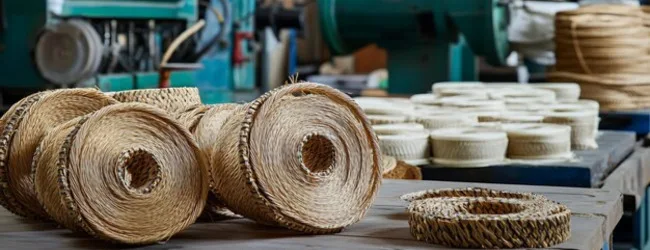
Embracing the strength and sustainability of jute, this manufacturing idea allows for the creation of durable, eco-friendly products that meet the growing demand for natural alternatives.
Idea Deep Dive:
- Specialize in specific jute products (bags, mats, home decor).
- Offer customized designs and printing.
- Create eco-friendly alternatives to plastic products.
- Offer different weave types, and material thickness.
a. Why this Idea:
- Growing demand for sustainable and eco-friendly products.
- Versatile material with various applications.
- Potential for export markets.
b. Licenses Required:
- Shop Act License.
- GST registration (if applicable).
c. Investment Required:
- Jute fabric and yarn (₹20,000-₹25,000).
- Sewing machines and cutting tools (₹15,000-₹20,000).
- Printing equipment (screen printing) (₹5,000-₹8,000).
- Packaging materials.
d. How to Sell:
- Retail stores and boutiques.
- Online platforms (e-commerce sites).
- Exhibitions and trade shows.
- Corporate gifts.
e. Any other Requirements:
- Basic sewing and crafting skills.
- Design skills (if offering customized products).
- Storage for fabric.
f. Challenges in the Idea:
- Competition from larger manufacturers.
- Sourcing high-quality jute fabric.
- Maintaining consistent quality.
g. How to overcome the Challenges:
- Focus on unique designs and high-quality finishing.
- Build relationships with reliable jute suppliers.
- Strong marketing.
h. Example: Produce custom designed jute bags with unique prints, and sturdy stitching, for corporate gifts and retail.
10. Clay Products Manufacturing
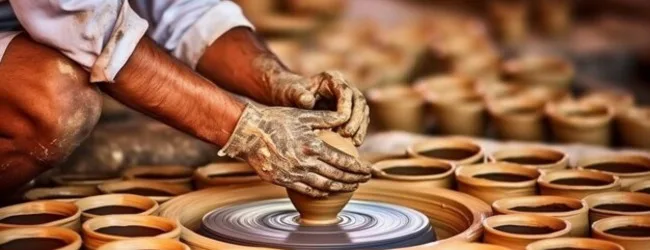
Molding earth into art and functionality, clay product manufacturing offers the chance to craft unique pottery, decorative items, and utensils that bring natural beauty and practicality to homes.
Idea Deep Dive:
- Specialize in specific clay products (pots, decorative items, utensils).
- Offer different types of clay (terracotta, stoneware).
- Create hand-painted or glazed finishes.
- Offer custom orders.
a. Why this Idea:
- Growing demand for traditional and eco-friendly products.
- Unique and artistic products.
- Home decor popularity increase.
b. Licenses Required:
- Shop Act License.
- GST registration (if applicable).
c. Investment Required:
- Clay (₹10,000-₹15,000).
- Pottery wheel and kiln (₹15,000-₹20,000).
- Tools and glazes (₹5,000-₹8,000).
- Packaging materials.
d. How to Sell:
- Local markets and craft fairs.
- Online platforms (Etsy, home decor sites).
- Home decor stores and boutiques.
Direct sales.
e. Any other Requirements:
- Basic pottery skills.
- Kiln operation knowledge.
- Workspace with ventilation.
f. Challenges in the Idea:
- Breakage during drying and firing.
- Maintaining consistent quality and finish.
- Kiln temperature consistency.
g. How to overcome the Challenges:
- Proper drying techniques and careful handling.
- Use high-quality glazes and firing techniques.
- Proper kiln maintenance.
h. Example: produce clay pots, that are designed with unique textures, and hand painted designs, and that are marketed towards those that are looking for unique, eco-friendly home decor.
Need Expert Guidance?
Starting a business can be challenging, but you don’t have to do it alone! At Boss Wallah, our 2,000+ business experts are ready to provide valuable insights and guidance. Whether you need help with marketing, finance, sourcing, or any other area of any business, our business experts are here to help you succeed- https://bw1.in/1116
Confused about Which Business to Start?
Want to start your own business but unsure which one to choose? Explore Boss Wallah, where you’ll find 500+ courses by successful business owners, featuring practical, step-by-step guides on starting and growing various businesses. Find your perfect business idea today – https://bw1.in/1111
Conclusion
Starting a manufacturing business under ₹50,000 requires dedication, creativity, and a keen understanding of your target market. By focusing on niche products, maintaining high-quality standards, and leveraging online and offline sales channels, you can build a thriving business. Remember to prioritize customer satisfaction, embrace innovation, and continuously adapt to market trends. This approach will set you on a path to sustainable growth and long-term success.
Expanded Frequently Asked Questions (FAQs)
1 . How do I determine the market demand for my chosen manufacturing product?
- Conduct online research, analyze competitor offerings, and talk to potential customers in your target market.
2 . What are the best strategies for pricing my manufactured products?
- Calculate your production costs, research competitor pricing, and consider the perceived value of your products.
3 . How can I build a strong brand identity for my manufacturing business?
- Develop a unique brand name, logo, and visual identity. Focus on consistent messaging and storytelling to connect with your audience.
4 . What are the key considerations for setting up a home-based manufacturing workspace?
- Ensure adequate space, proper ventilation, and safety measures. Organize your workspace for efficient production.
5 . How can I manage my finances effectively in a small manufacturing business?
- Track your expenses and income meticulously. Create a budget and regularly review your financial performance.
6 . What are the best practices for packaging and shipping my manufactured products?
- Use sturdy and attractive packaging that protects your products during transit. Partner with reliable shipping carriers for timely delivery.
7 . How can I build strong relationships with my suppliers?
- Pay on time, communicate clearly, and treat them with respect.
8 . How do I protect my intellectual property, like unique designs or formulas?
- Consider trademarks, copyrights, and patents, where applicable. Consult with a legal professional for advice.
9 . What are the best ways to get customer feedback, and improve my products?
- Ask for reviews on online platforms. Use social media polls, and surveys.
10 . How can I automate parts of my manufacturing process, as I grow?
- Invest in tools, and machines, that can speed up, and make repetitive tasks, more efficient. Research, and compare tools, before purchase.


